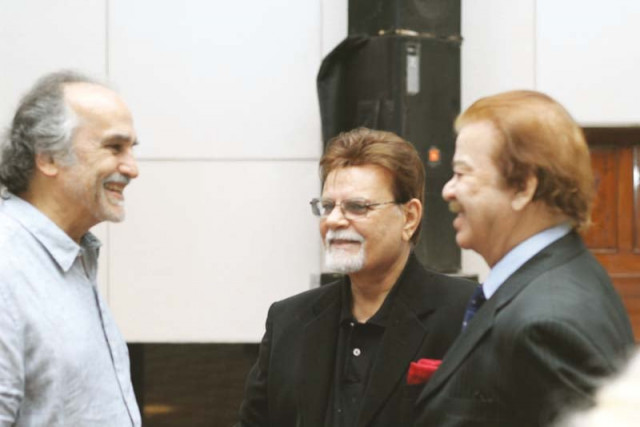Pakistan Calling Film Festival comes to a close
Two-day event ends with screening of short films by budding film-makers, panel discussions on social change

Jury member Jamil Dehlavi (L) with veteran television actors Shakeel (C) and Qazi Wajid (R). PHOTO COURTESY: USMAN AHMED
The first discussion titled ‘The Future of Animation in Pakistan’ included Muqeem Khan, Amyn Farooqui, Muhammad Bilal and Kamran Khan and revolved around how the industry can be developed by setting up animation-centric schools and making a pathway for students to take up animation as a career.
The second panel ‘Film for Social Change’ included Muhammad Ali Naqvi, documentary film-maker Maheen Zia, designer Yousuf Bashir Qureshi, Arbab Hussain and Aquila Ismail, who spoke about the power of moving image to shape public perception and how it can be used to foster positive social change.
Additionally, there was a workshops on acting and directing conducted by NAPA alumni Zeeshan Haider and another on screenwriting by Eman Syed. An award ceremony was held ,where five of the best works were awarded by the jury, which included film-makers Jami Mahmood and Jamil Dehlavi. Taqseem, by budding film-maker Seraj-us-Salikin, won the best short film (fiction), Hellhole by acclaimed photographer Mobeen Ansari won the best short film (nonfiction) while Canned by Tanya Zaman won the best animated short film. Doorbeen (Binoculars) by Aamir Mughal won the Committee Award. Feature length documentary K2 and the Invisible Footmen by Lara Lee was awarded the International Award.
Talking to The Express Tribune, Dehlavi, known for his 1998 film Jinnah, said, “There were some wonderful films that I watched and it was difficult to narrow them down.” He said he had found the work of the new film-makers interesting but felt concerned at the same time. “The thing is, we need to find a venue for them. They are producing interesting work but is there an audience for it? That’s what worries me.” He advised the young film-makers to hang in there and continue making films, nonetheless.
To close the ceremony, veteran television actor Qazi Wajid was presented the lifetime achievement award by his colleague and friend Shakeel. A short compilation of Wajid’s long career and some of his most memorable moments were played as the audience gave a standing ovation and applauded the actor upon receiving the award. Wajid talked about his long-standing career, starring in acclaimed serials such as Aangan Terha, Dhoop Kinare, Taleem-e-Balighan and his friendship with Shakeel.
He also commended the Pakistan Calling initiative, stating it is a positive platform that motivates new talents. “More film festivals should be held. That’s how you encourage people. That’s how they learn.”
Commenting on the current condition of Pakistani cinema, Wajid shared there are both good and bad films, but film-makers shouldn’t get discouraged. “I see a better future. If you encourage these young emerging film-makers and give them a platform, they will do better work tomorrow.”
Shakeel also shed light on the preservation of the history of Pakistani cinema. “If you don’t have a past, you don’t have a present or a future. This is our legacy and it is great that people are making efforts to preserve it and introduce it to the newer generations.”
Published in The Express Tribune, November 29th, 2016.
Like Life & Style on Facebook, follow @ETLifeandStyle on Twitter for the latest in fashion, gossip and entertainment.



















COMMENTS
Comments are moderated and generally will be posted if they are on-topic and not abusive.
For more information, please see our Comments FAQ